Zimbabwe
Zimbabweans will have a ‘tall list’ literally to pick from when they head to the polls on July 30 to elect a new president.
The historic nature of the poll is not only in the fact that Mugabe will for the first time in over three decades be absent on the ballot paper but also that there are a record number of candidates in the race.
The roll of 19 men added plus four women brings the figure to twenty three. But as has usually been the case, there are two main front runners. Incumbent Emmerson Mnangagwa and main opposition Nelson Chamisa.
Other notable candidates in the race are former vice-president Joice Mujuru (leader of the People’s Rainbow Coalition) and another woman in the person of Khope Thokozani, who leads a faction of the main opposition party.
Two other women are in the race – Dzapasi Melbah of #1980 Freedom Movement Zimbabwe and Mariyacha Violet of United Democratic Movement.
This review looks at the two main candidates in the race as part of our Africa Elections umbrella and special coverage of the Zimbabwe harmonized elections.
Emmerson Dambudzo Mnangagwa of ruling Zanu-PF
Zanu-PF has been the governing party of Zimbabwe since independence in 1980. Following the events of November 2017, when Robert Mugabe was ousted, the party has a new leader, Emmerson Mnangagwa.
Mnangagwa was a leading member of the party rising to the post of Vice-President in December 2014. He had previously held different portfolios in the country including Security Minister and Minister of Justice under Mugabe.
He fought in the pre-independence war days when the country was referred to as Southern Rhodesia. Along with others, he received extensive military training across Africa and in China.
He was a founding member of a guerilla group known as the “crocodile gang” back in the 60s. Mnangagwa was nicknamed ‘Garwe’ or ‘Ngwena’, which means ‘the crocodile’ in the Shona language initially because of the group he belonged to, but later because of his political shrewdness.
He was arrested in the mid-sixties for sabotage and was held at different prisons reportedly tortured at a point before he was released and deported to Zambia. Whiles in Zambia, he studied to attain a law degree before he was elected a special assistant to Robert Mugabe – leader of the revolution.
Here are some political positions he has previously held:
- 1980–1988: Minister of State Security and Gukurahundi
- 1988–2005: Minister of Justice and Speaker of Parliament
- 2008: return to parliament, chief agent of Mugabe campaign
- 1990s: Key player in implementing the “Indigenization and Black Economic Empowerment” initiative
- December 2014 – November 2017: First Vice-President
He held his veep post until November 2017, when he was dismissed over disloyalty and disobedience to Mugabe. Mnangagwa, however, bounced back as president of Zimbabwe after a ‘military intervention’ in the same month.
He took over two of Mugabe’s previous roles – as leader of party and of government. In the seven months that he has been at the helm, his main election promise has been that “Zimbabwe is open for business.”
In a bid to undo years of diplomatic and economic isolation and sanctions imposed on Zimbabwe due to domestic policies embarked upon by Mugabe.
Amid claims of the abuse of incumbency – in the area of state-media coverage and distribution of food – and claims that the government was manipulating the elections body, Zanu-PF insists that it remains the most credible party to run the affairs of Zimbabwe.
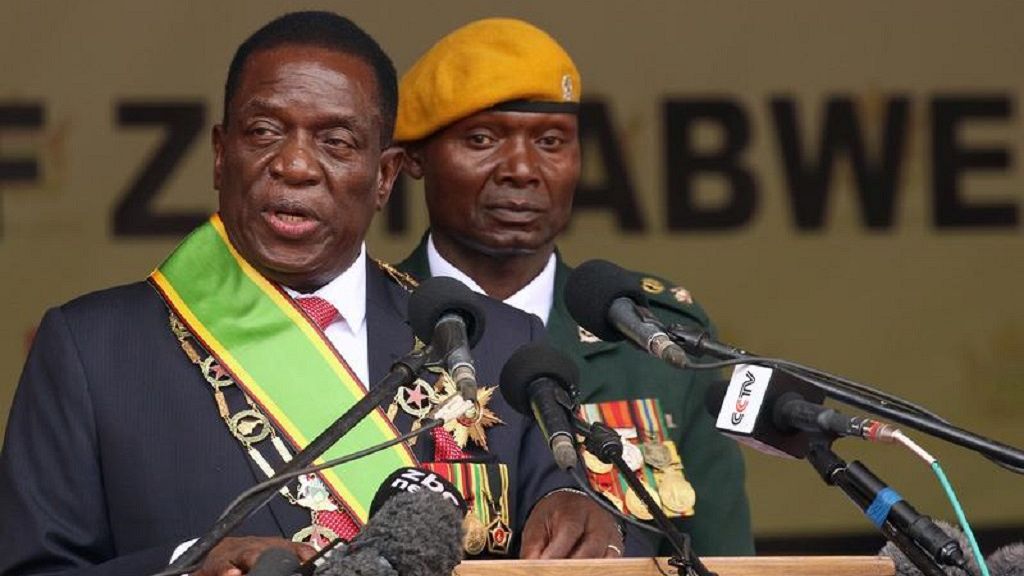
The Zanu-PF 2018 elections manifesto is built on the following main points:
- Unity
- Fighting corruption
- Development
- Re-engagement
- Creation of jobs
- Restoration of dignity
Nelson Chamisa of the Movement for Democratic Change Alliance
The forty-year-old Nelson Chamisa is a trained lawyer, current Movement for Democratic Change – Allaince (MDC Alliance) President and member of the House of Assembly for Kuwadzana, located in the capital, Harare.
The MDC Alliance is a coalition of seven parties rallying round the candidature of Chamisa who was a close ally of veteran opposition leader Morgan Tsvangirai.
He served as Information Minister in 2009 when his boss entered a unity government deal with Mugabe after disputed polls. He served as a cabinet minister between 2009 and 2013 till the end of the unity government.
He had before that held the position of party secretary, as spokesperson due to his eloquence and also as national youth chairman of the then MDC. He holds a degree in political science and administration from the University of Zimbabwe, he attained his LLB from the same institution.
He was one of Tsvangirai’s deputies when the former leader died. The MDC-T split as Chamisa and the main MDC-T veep Khope failed to reconcile differences. The Alliance has some heavyweights in Zimbabwe politics among others ex-finance minister Tendai Biti and Welshman Ncube, a lawyer and politician.
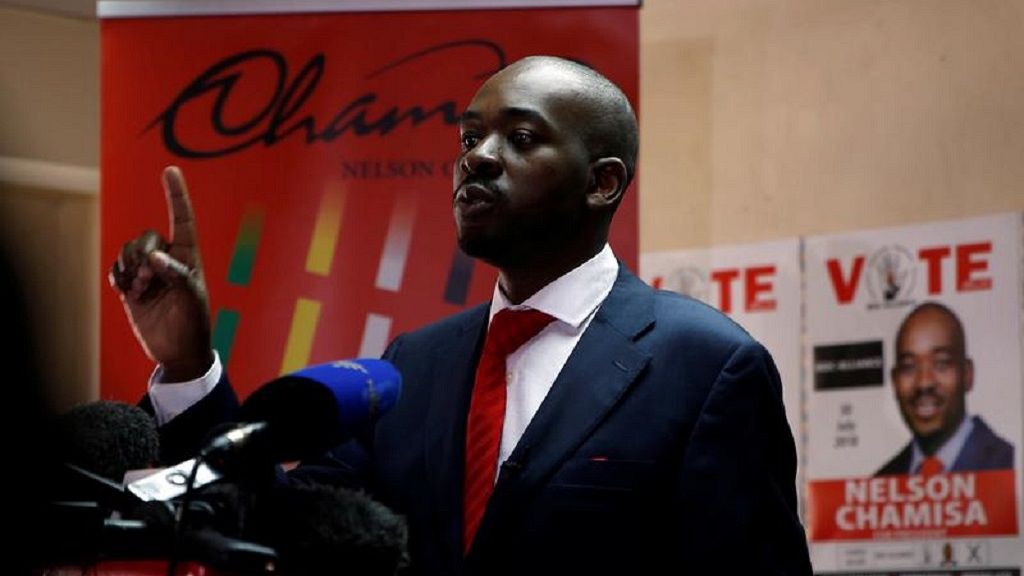
The MDC Alliance’s main election slogan is “It’s time for change,” drumming home the message that it was now or never in seeking to wrestle political power from Zanu-PF after years of mismanaging the country.
According to the Alliance, Zanu-PF has caused poverty and suffering among Zimbabweans. The party has asked Zimbabweans to give a new generation the opportunity to rebuild Zimbabwe.
The coalition has the following members:
- Nelson Chamisa led MDC-T
- Welshman Ncube led MDC
- Tendai Biti led People’s Democratic Party
- Jacob Ngarivhume led Transform Zimbabwe
- Agrippa Mutambara led Zimbabwe People First
- Multi-Racial Christian Democratic Party
- Zanu Ndonga
MDC Alliance Elections Manifesto states its vision for the southern African nation as follows: “An inclusive, socially just, prosperous, tolerant, transformative and democratic developmental state in which people have equal opportunities to pursue happiness.”
Manifesto main promises:
- Governance, nation-building and the consensus state
- Building a shared and inclusive economy
- Development and urbanisation of rural areas (dura)
- Universal access to health care
- Social justice and service delivery
- Citizens rights, interests & protection
- Reconstruction & remodeling of the country’s infrastructure
Full list of Presidential Candidates for Zimbabwe 2018 Elections
- Busha Joseph Makamba of FreeZim 2. Chamisa Nelson of MDC Alliance
3. Chiguvare Tonderai Johann. of People’s Progressive Party
4. Chikanga Evaristo Washington of Rebuild Zimbabwe
5. Dzapasi Melbah of #1980 Freedom Movement Zimbabwe
6. Gaya Mapfumo Peter of United Democratic Front
7. Hlabangana Kwanele of Republicans Pany of Zimbabwe
8. Hove Mhambi Divine of National Alliance of Patriotic and Democratic
9. Kasiyamhuru Blessing of Zimbabwe Partnership for Prosperity
10. KhupeThokozani of Movement for Democratic Change-T
11. Madhuku Lovemore of National Constitutional Assembly
12. Mangoma Elton Steers of Coalition of Democrats
13. Manyika Noah Ngoni of Build Zimbabwe Alliance
14. Mariyacha Violet of United Democratic Movement
15. Mnangagwa Emmerson Dambudzo of Zimbabwe African
16. Moyo Nkosana Donald of Alliance for the People’s Agenda
17. Mteki Bryn Taurai an Independent
18. MugadzaWilliam Tawonezvi of Bethel Christian Party
19. Mujuru Joice Teurai Ropa, of People’s Rainbow Coalition
20. Munyanduri Tendai Peter of New Patriotic Front
21. Mutinhiri Ambrose of National Patriotic Front
22. Shumba Daniel of United Democratic Alliance
23. Wilson Harry Peter of Democratic Opposition Party.
Click here for all the election news on our Africa Elections page



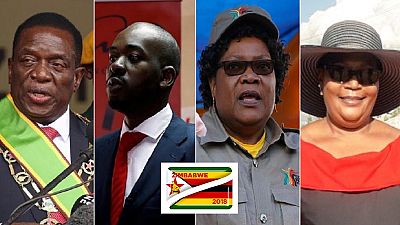




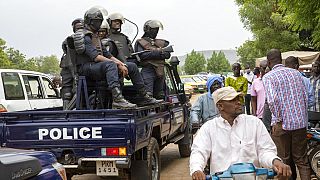
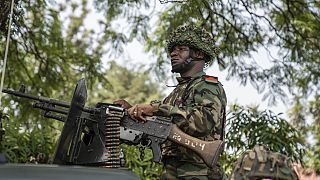
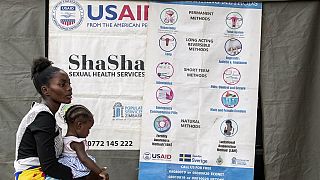

00:58
Somaliland opposition leader wins presidential poll
11:05
New era of sovereignty in Mali's gold sector [Business Africa]
01:10
Voters head to polls in Somaliland as leaders hope for global recognition
01:11
Chad's electoral body disqualifies senior ruling party official
01:44
Mauritius heads to the polls in wake of wiretapping scandal
01:37
UN agricultural fund calls for adaptation financing for small-scale farmers